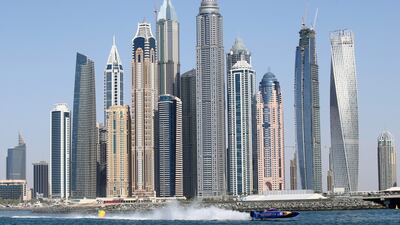Problems with leaky buildings and poor energy use in the UAE are partly caused by climate and a desire for signature buildings, but performance is gradually improving as building codes become more rigorous, experts say.
Paul Crayford, the mechanical, electrical and plumbing group director for building consultancy Buro Happold, says that there have been “very different drivers in the Middle East for buildings”.
A need to increase status in the global market has led many clients to commission architects for “signature” buildings, which often means glass-clad towers with poor thermal capabilities, especially when it is so hot outside.
“Fundamentally, when we start talking about building glass towers in the desert at 46°C, we’re always going to have a problem,” Mr Crayford says.
Saeed Al Abbar, chairman of the Emirates Green Building Council, says that for buildings with a lot of glass, the performance of glazing is critical. Mr Al Abbar says double glazing “is effectively standard now in all buildings in the UAE”, and is used alongside improved thermal insulation and more efficient air-conditioning to prevent cool air leaking out and hot air coming in.
“Of equal importance is the air tightness of the building envelope,” Mr Al Abbar says.
“By paying careful attention to quality control during design and construction, the air-tightness of a building can be significantly improved, which in turn provides significant savings in energy.”
Peter Pardoe, a business unit director for engineering consultancy Arcadis, says that trying to keep buildings at the recommended temperature of 24°C is difficult when external temperatures are above 40°C.
“It does create very large cooling loads unless you can create a method for more thermally efficient buildings, and that’s where we are at the moment,” Mr Pardoe says.
“Clearly you can’t just keep on increasing your amount of cooling because it’s expensive to produce. Therefore, you’ve got to take a view on trying to make your buildings more efficient.”
He says better insulation is one way of doing that.
“Also, there’s still some work to do on thermal bridging – making sure that you don’t have materials that are getting heated up on the outside of your building and allow the heat to transfer to the inside,” Mr Pardoe says.
“Creating a thermal barrier in between the external and internal surfaces of your building is really important.”
Mr Crayford says one thing engineers have typically done in the region is to gently pressurise buildings, so that the air pressure inside is 10 per cent higher than outside. This repels hot air and dust from outside, as well as moisture.
“We’re really worried about untreated air coming into buildings here. And while we can sell an energy story around that, it’s predominantly driven by the need to keep buildings dry.”
Experts agree that the adoption of green building codes, such as the Estidama rating system adopted by Abu Dhabi in 2010, and the Dubai Green Building Regulations introduced in 2014 and due to be supplemented by the Al Safat rating system this week, have helped to drive up standards.
Some of the benchmarks, however, have been adapted from international regulations so that targets are easier to meet, given local conditions.
“What you’ve got to remember is that compared to some western countries the UAE is still relatively new down this path,” Mr Pardoe says.
“But we’ve taken it on board here a lot quicker than lots of places in the world. The introduction of a rating system for buildings was talked about for years in the western world.
“It’s been talked about for maybe 10 years here and it’s been implemented. On the whole, it’s very successful.”
And while such codes will drive efficiency standards for new buildings, Mr Al Abbar says that there is still plenty that can be done reasonably cheaply to improve the performance of existing buildings.
These include “optimisation of maintenance practices or lighting retrofits”, while slightly more expensive methods include upgrading building envelopes and retrofitting chiller units.
Ultimately, Mr Crayford says, the best way of getting people to improve leaky buildings is to increase the price of power.
“In developing nations as a rule, power is very cheap. When you leave the lights on all day or the air conditioning, it doesn’t really hit you that hard.”
mfahy@thenational.ae


